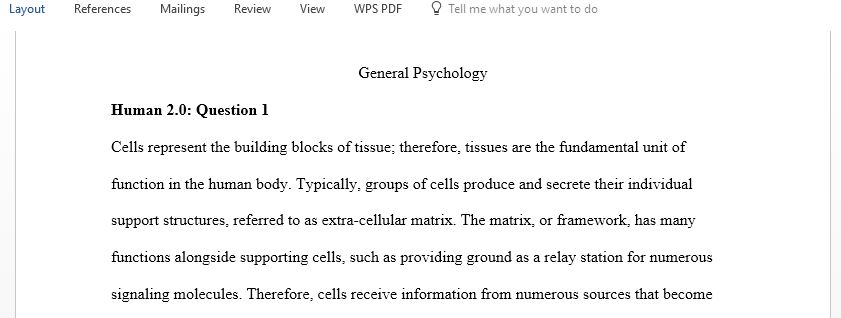General Psychology questions: Humans, Post/Trans-humans and The Culture Industry and Control Societies
General Psychology questions: Humans, Post/Trans-humans and The Culture Industry and Control Societies. This exam is an open-book comprehensive final consisting of essay questions on topics central to the course. You should answer three questions, one from each lettered section (A, B and C). There are 20 possible total points for the exam. (You may also answer one additional question for 4 extra credit points.) Respond to each question in essay form. Cut and paste each question you are responding to into a separate page; draft and revise your responses; and present each of your essays in a standard 12-point font, double-spaced with 1-inch margins and appropriate citations.
A. Humans 2.0
1. Several theorists we have examined have argued that the fusion of information technologies and biotechnologies in fields such as bioinformatics and synthetic biology offers the prospects of enhancing and possibly recrafting the human body. Discuss developments from reproductive medicine, regenerative medicine, tissue engineering and/or neuroengineering that illustrate some of these ideas about engineering Human 2.0.
B. Post/Trans-humans
2. Ray Kurzweil and Bill Joy argue that intelligent machines will replace human beings. Discuss their reasons for holding these views and their ideas about a “transhuman” future.
3. In reflecting on the future of intelligent machines Rodney Brooks writes, “Eventually, we will create truly artificial intelligences, with cognition and consciousness recognizably similar to our own… At the same time, we humans will transform ourselves…We will incorporate a wide range of advanced sensory devices and prosthetics to enhance our bodies. As our machines become more like us, we will become more like them.”
How might Brooks (and others who share his views, such as Katherine Hayles) imagine that we will become “seamlessly articulated with intelligent machines”?
C. The Culture Industry and Control Societies
4. In her Cyborg Manifesto Donna Haraway argues that communications technologies and biotechnologies are the crucial tools recrafting our bodies in the new age of the “Informatics of Domination.” These tools, she says, embody and enforce new social relations for women world-wide. She says that “these technologies and scientific discourses can be partially understood as moments of the social interactions constituting them,” but, she goes on to say, “they should also be viewed as instruments for enforcing meanings.” Is the cyborg (us) living in the “informatics of domination” a prophet of hope and liberation?
Answer preview for General Psychology questions: Humans, Post/Trans-humans and The Culture Industry and Control Societies
Access the full answer containing 945 words by clicking the below purchase button

